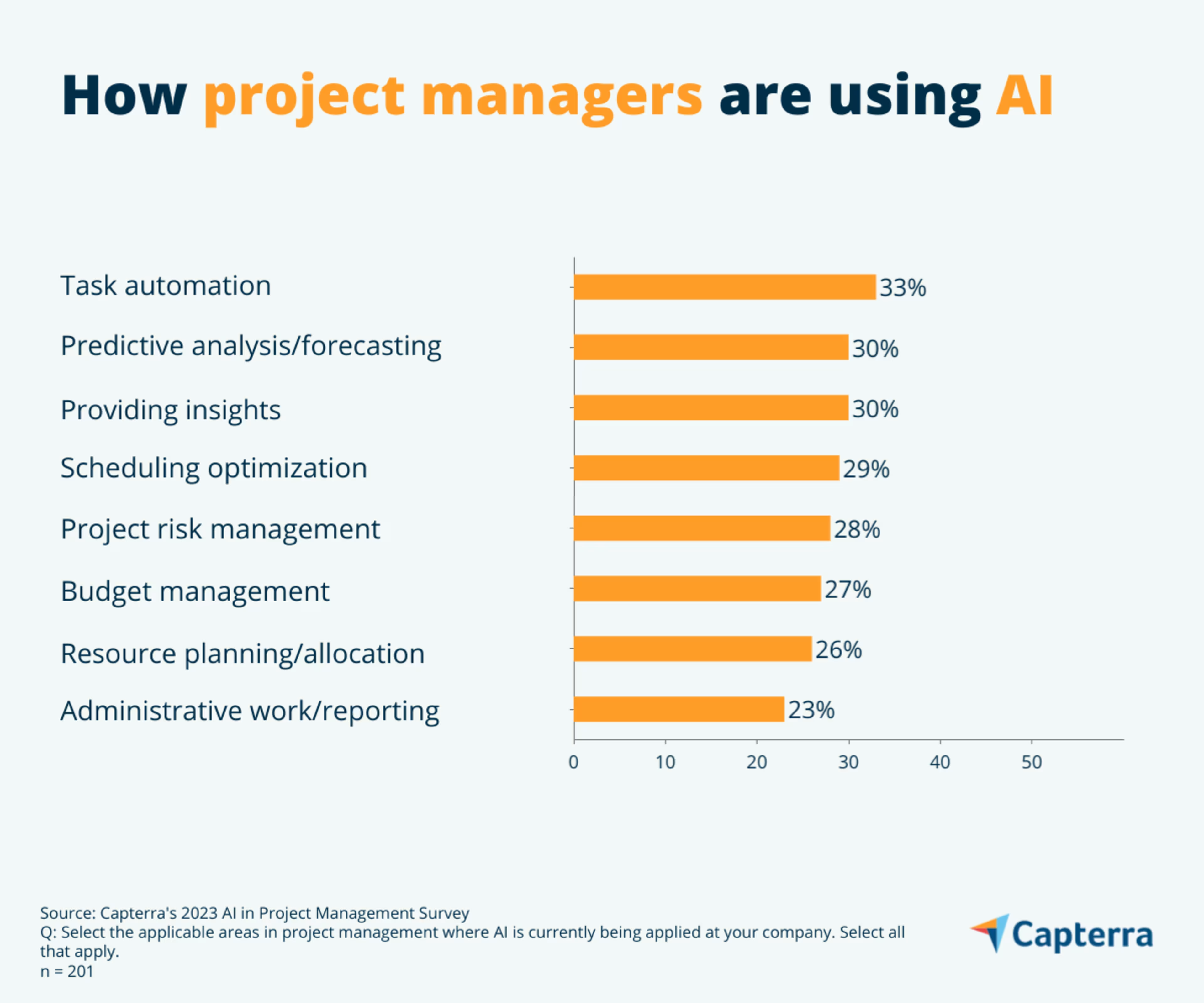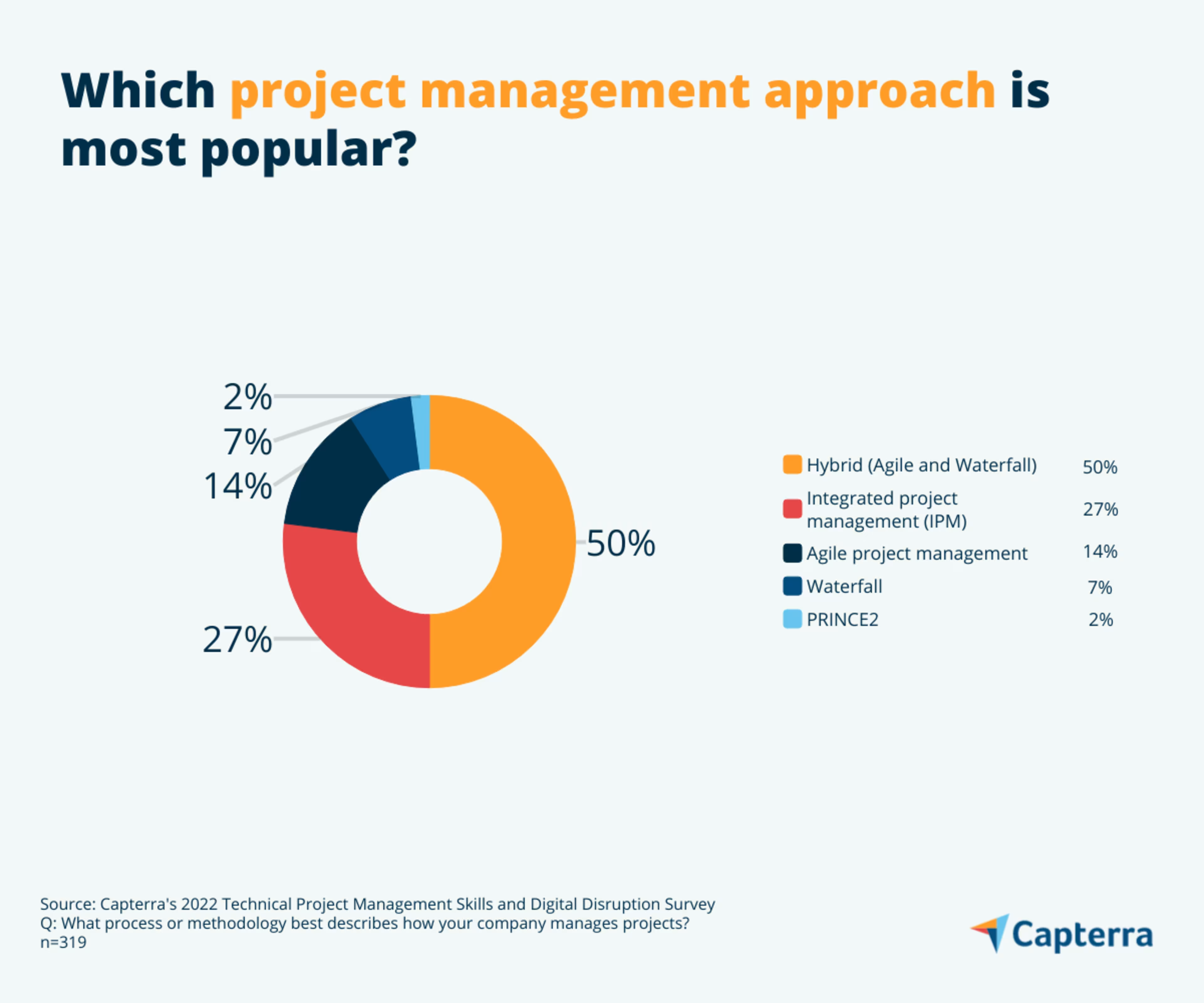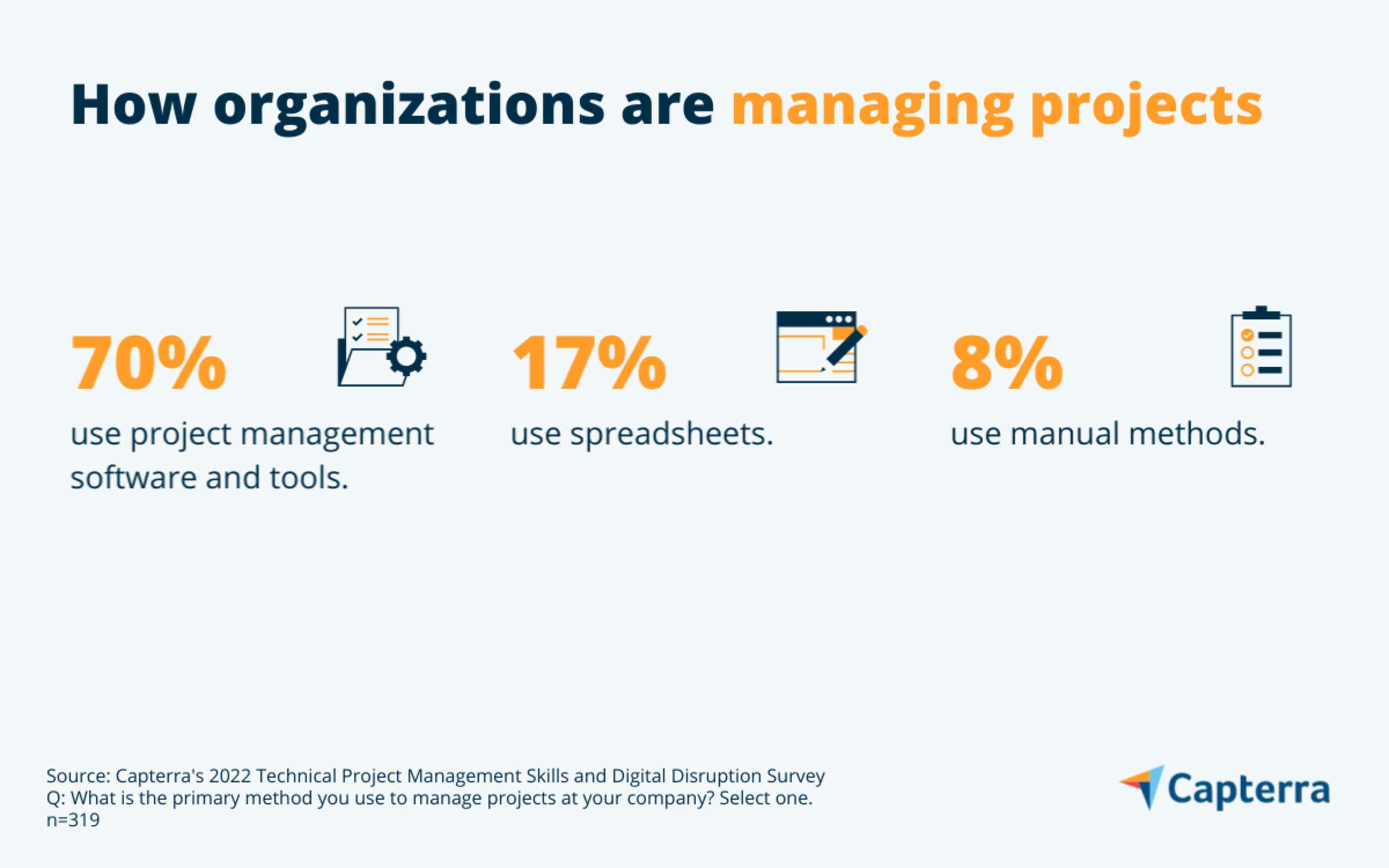In today's complex and ever-evolving business environment, it's more pressing than ever for project management professionals, business owners, and team leaders to stay up to date with the latest project management trends.
Our 2022 Technical Project Management Skills survey reveals the biggest product management trends of 2023—for example, a significant majority of project managers (70%) are now harnessing the power of project management software to streamline workflows, boost productivity, and enhance decision-making processes*.
What's more, the rise of artificial intelligence has begun to leave its mark on the industry, with 32% of respondents in Capterra's 2023 AI in Project Management survey indicating that they use AI for task automation, signaling a shift towards more advanced, integrated technologies**.
Learn how to leverage these developments, positioning your small or midsize business (SMB) at the vanguard of project management innovation.
1. Artificial intelligence will reinvent task automation
Artificial intelligence is shaking things up in project management. It's boosting efficiency and providing fresh insights that are transforming traditional methods.
Capterra's AI in PM survey** reveals the extent to which AI is currently making its mark in various areas of project management:

AI in project management has altered how businesses operate and has yielded significant benefits. According to our survey, respondents have noticed three primary advantages of using AI in their project management processes:
Automating repetitive and tedious tasks to free up time for problem-solving (32%): AI's automation capabilities can take over monotonous tasks, enabling team members to dedicate their time and expertise to complex problem-solving activities.
More effective use of project resources (32%): AI can help with resource planning and allocation, ensuring more effective use of resources. It can predict project demands and assist in making informed decisions about how and where resources are deployed. This leads to greater efficiency and fewer instances of over- or under-utilization.
Providing more accurate metrics for data-driven decision-making (26%): AI-powered tools can gather and analyze a large amount of data, delivering more accurate and comprehensive project metrics. These insights empower project managers to adopt data-driven decision-making, enhancing overall project performance and outcomes.
What this means for your SMB
Task automation in AI project management tools is a secret weapon for small to midsize businesses that are dealing with limited resources and tight schedules. Routine tasks like sending updates or scheduling meetings can be automated, giving team members more time to concentrate on key tasks like building client relationships or product development. AI can help your business punch above its weight.
Advice moving forward
Remember that one size doesn't fit all when it comes to AI-enabled PM tools. What is the best way to choose a tool? Consider your team's specific needs. For instance, a team that often collaborates remotely might benefit from a tool with strong communication features. If your projects are data-heavy, you might need a tool that excels in data analysis and reporting. Check out Capterra's project management software directory, where you can filter for different software features that will best suit your needs.
/ Read more
Want to learn more about the benefits of using AI in project management? Check out "How AI Can Help Project Managers Bring the Focus Back to People."
2. Hybrid project management is the most common approach
Different project management methodologies have emerged and evolved in response to changing project needs and complexities. According to our technical project management skills survey*, a hybrid approach that combines elements of both Agile and Waterfall methodologies has taken the lead as the most prevalent method for managing projects, with a striking 50% of respondents adopting this approach.

Hybrid (Agile and Waterfall) (50%): This approach combines Agile's flexibility with the structured planning of Waterfall, providing teams with the best of both worlds. It supports adaptability in the face of changes while maintaining a clear project roadmap.
Integrated project management (IPM) (27%): IPM is a comprehensive approach that unifies all aspects of project management for enhanced coordination and communication. It emphasizes aligning the project team, processes, and tools.
Agile project management (14%): Agile is known for its flexibility and is favored by teams dealing with frequent changes and requiring continuous customer feedback. It incorporates iterative development and encourages adaptive planning.
Waterfall (7%): This conventional methodology is commonly used in projects with clearly defined and stable requirements. It follows a linear, sequential approach, with each phase depending on the deliverables of the previous one.
What this means for your SMB
The popularity of hybrid project management approaches, especially among small to midsize businesses, indicates the need for both flexibility and structure in managing projects. This approach allows businesses to leverage the adaptability of Agile to quickly respond to changes (which is often necessary in smaller, fast-paced environments) while also benefiting from the robust structure of Waterfall for clear planning and deliverable-based progression.
For instance, a small marketing firm may use the Agile part of its hybrid methodology to quickly adapt its marketing strategies based on real-time feedback. However, they may use Waterfall principles for large campaigns where all deliverables must be clearly defined from the outset.
Advice moving forward
To leverage the benefits of hybrid methodologies, professionals should first assess their project requirements and team capabilities. Training may be necessary to ensure the team understands both Agile and Waterfall methodologies and can implement them effectively. Remember, the goal is to adopt an approach that maximizes your team's efficiency and output without compromising the quality of the end deliverable.
/ Read more
Learn more about Agile and Waterfall methodologies in "Agile vs. Waterfall: Two Project Management Methodologies Explained & Advice on When to Use Them."
3. Project management software plays a significant role in project effectiveness
The way organizations manage projects significantly impacts their effectiveness and success. Our survey reveals that 70% of respondents primarily use project management software and tools, eclipsing other methods such as spreadsheets, manual methods, and non-project management software such as CRM systems or office management suites.

Additionally, when considering the factors that would have improved the effectiveness of their last major change project, 58% of respondents in Capterra's change management survey*** identified better software tools.
What this means for your SMB
The high reliance on project management software and tools underscores their crucial role in managing projects effectively, especially for small to midsize businesses. These businesses often operate in fast-paced environments where efficient resource allocation and streamlined processes are vital. Project management software can offer essential features such as task tracking, resource allocation, timeline projections, and real-time collaboration, significantly enhancing project execution.
Advice moving forward
Your small to midsize businesses should invest in reliable project management software if you haven't already. The software should cater to your specific team needs, whether it's task management, team collaboration, or resource allocation. Proper training should also be provided to ensure all team members can effectively use the software, maximizing its potential benefits.
/ Read more
Check out Capterra's buyers guide for project management software to learn more about what to prioritize during your software search.
How to leverage these project management trends
As we navigate this dynamic project management era, using artificial intelligence, hybrid approaches, and effective tools can greatly boost efficiency and success.
Consider investing in AI capabilities, particularly those focused on task automation and predictive analysis, and explore adopting a flexible, hybrid project management approach.
Make the most of project management software, especially for remote project management, to facilitate collaboration and streamline tasks.
By embracing these trends, you're not just staying updated—you're leading the way in the future of project management. To continue your journey and dive deeper into these trends, explore these helpful resources from Capterra:

